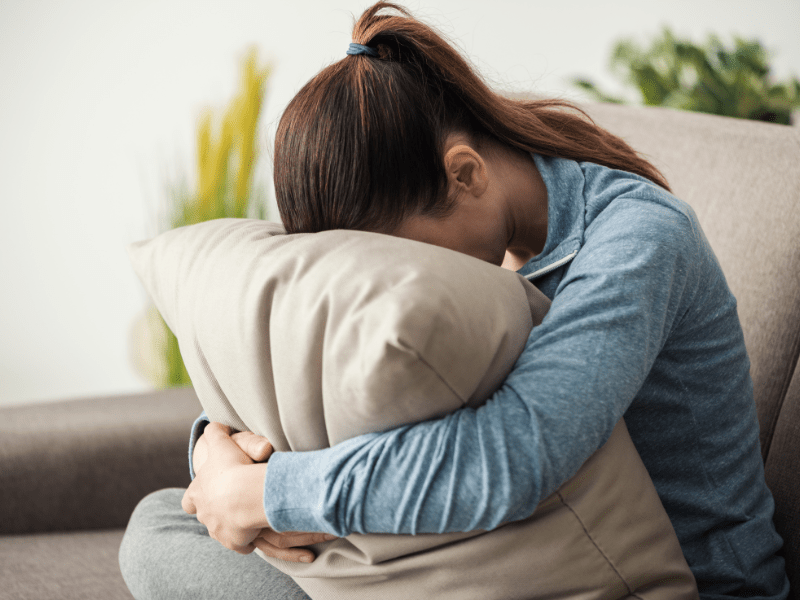Introduction
Has a strange sensation of being awake but unable to move ever jolted you from your sleep? Welcome to the perplexing world of sleep paralysis. Treading the thin line between consciousness and oblivion, this is a common yet mostly harmless condition that affects many people around the globe.
This article will shed light on what triggers these eerie episodes and propose preventive measures to help you gain control. Ready for some night-time knowledge? Dive in!
Understanding Sleep Paralysis
Understanding sleep paralysis involves delving into the realms of wakefulness and sleep stages. It's a temporary, albeit scary, phenomenon that leaves you conscious but immobile, trapped in between dreams and reality. This condition can strike when you're tumbling into slumber or just beginning to stir from it. The inability to move or speak during an episode is often compounded by disturbing hallucinations or the sensation of an ominous presence nearby.
The root cause of this eerie experience lies within our natural sleep cycle. Specifically, it’s tied to the rapid eye movement (REM) stage, where most dreaming takes place. An important process known as muscle atonia sets in during REM sleep, rendering us virtually paralyzed and preventing us from acting out our dreams physically. Under normal circumstances, this muscle atonia dissipates as transitions are made between varying states of consciousness and we wake up none-the-wiser about our temporarily paralyzed state.
Interestingly enough, sleep paralysis is linked with narcolepsy, a neurological disorder distinguished by excessive daytime drowsiness and sudden bouts of falling asleep. But it can also occur independently without any signifying underlying conditions.
Although its symptoms first crop up in youth—usually anywhere between 7-25 years—sleep paralysis can happen at any age thereafter; making understanding and awareness crucial for managing episodes effectively. Despite its terrifying nature, rest assured: research has shown that sleep paralysis poses no direct threat to your physical health even if it does give your nerves quite a scare!
Causes and Symptoms of Sleep Paralysis
- Sleep paralysis is believed to occur when the body experiences a disruption in the normal transition between sleep stages.
- It is thought that during sleep paralysis, there is a miscommunication between the brain and muscles, resulting in the inability to move.
- One of the main causes of sleep paralysis is disrupted sleep patterns or irregular sleep schedules.
- Sleep deprivation, insomnia, and jet lag can all contribute to episodes of sleep paralysis.
- Another common cause is narcolepsy, a neurological disorder that affects the brain's ability to regulate sleep-wake cycles.
- Other factors that can increase the likelihood of experiencing sleep paralysis include high levels of stress, anxiety disorders, and certain medications.
- Sleep paralysis often occurs alongside other sleep disorders such as nightmare disorder or hypnagogic hallucinations.
- The symptoms of sleep paralysis typically include being aware of one's surroundings but feeling completely unable to move or speak.
- Many individuals report intense feelings of fear or terror during episodes of sleep paralysis.
- Visual and auditory hallucinations are also common, with people often reporting seeing shadowy figures or hearing strange noises in the room.
Conclusion
In conclusion, sleep paralysis is a temporary condition where individuals are awake and conscious but unable to move or speak. It often occurs during the transition between wakefulness and sleep stages, specifically during the rapid eye movement (REM) stage.
Although it can be a terrifying experience, sleep paralysis is generally harmless and not considered a health risk. Ongoing research aims to shed more light on its causes and potential treatments.
FAQs
1. What is sleep paralysis?
Sleep paralysis is a phenomenon that occurs when a person is temporarily unable to move or speak while falling asleep or waking up. It is often accompanied by a sense of pressure on the chest and hallucinations.
2. Is sleep paralysis dangerous?
While sleep paralysis itself is not considered physically harmful, it can be extremely distressing and frightening for those who experience it. It may also be associated with other sleep disorders or underlying medical conditions that should be addressed.
3. What causes sleep paralysis?
Sleep paralysis can occur due to disruptions in the normal sleep cycle, such as irregular sleeping patterns, insomnia, stress, anxiety, and certain medications. It can also be linked to narcolepsy and other sleep disorders.
4. How can I prevent or manage sleep paralysis?
Practicing good sleep hygiene habits such as maintaining a regular sleep schedule, creating a calm sleeping environment, managing stress levels, and avoiding stimulants before bedtime may help reduce the occurrence of sleep paralysis episodes. If episodes persist or are causing significant distress, it's advisable to consult with a healthcare professional for further evaluation and guidance.
Experience comfort you control with iSense. Every iSense mattress features twenty adjustable comfort settings to adjust each side of the bed. Whether soft or firm, sink into head-to-toe pressure relief. Try an iSense mattress risk free for 180 nights here.






















